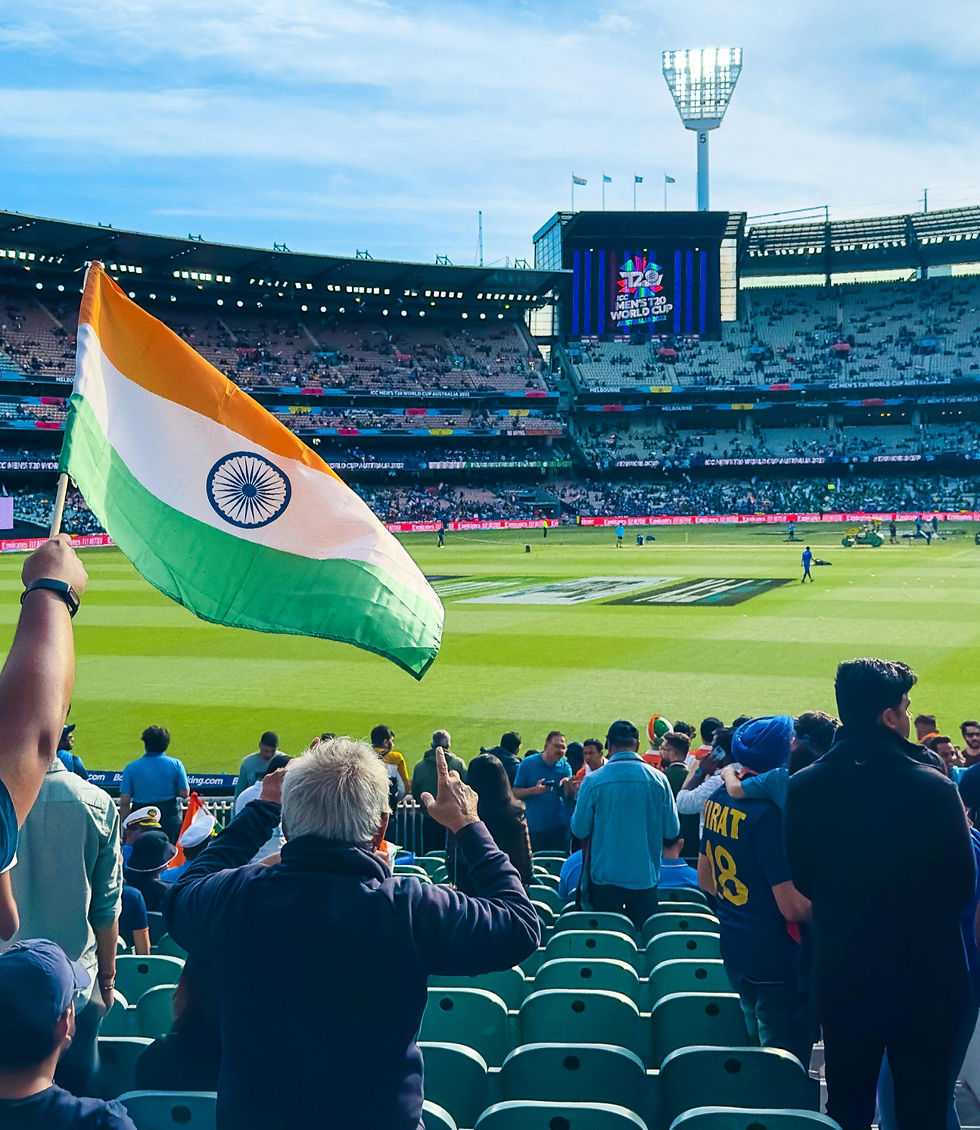Stuck in the middle with you: The reality of being a British Indian cricket fan
- Selina Kotecha
- Jul 17, 2025
- 3 min read
Updated: Jul 22, 2025

It's the beginning of South Asian Heritage Month and I found myself between two teams: What Cricket means to British Asians
Cricket has always been part of my life. Sometimes, just in the background like hearing my grandad animatedly discussing Sachin Tendulkar and Rahul Dravid on the phone with friends, dissecting every match and passionately analysing India’s performance.
Fast forward 25 years, and I found myself at Lord’s, the home of English cricket and the most prestigious ground in the country. Lord’s is steeped in tradition, from the iconic pavilion to the ringing of the five-minute bell that signals the start of play. It was my first time watching India vs. England live, and the experience was more emotionally divisive than I expected.
I was born and raised in West London. English is my first language. I respect the England cricket team, and if my children ever became professional cricketers, they’d represent England. But when it comes to international cricket, I support India.
And I’m not alone. While there are no official figures, I’d safely guess that 80–90% of British-born Asians support their heritage countries in cricket. This trend hasn’t gone unnoticed. The recent passing of Norman Tebbit brought renewed attention to his controversial “cricket test,” which questioned the loyalty of South Asian and Black immigrants who didn’t support England.
As with most things tied to identity, the reasons run much deeper.
For many British Asians, it comes down to belonging. Racism, both overt and subtle, has been a part of growing up here. Whether being called slurs or being asked where you’re “really from,” these experiences send a clear message: you are seen as different. Not quite part of the fabric.
This sense of exclusion extends to English cricket. While a few South Asian players have broken through, they remain underrepresented. Institutional racism within the game has been widely reported. When a team doesn’t reflect your community or worse, has been accused of discriminating against it, emotional allegiance becomes harder to sustain.
In contrast, supporting India offers a sense of familiarity and shared culture. At an India match, you're surrounded by British Indian fans who grew up like you with similar values, traditions, and life experiences. You don’t have to explain yourself. You don’t have to assimilate. That’s a huge relief in a society where many of us constantly adjust how we speak, act, or dress just to fit in. During recreational time, whether it’s sport, music, or social gatherings, we just want to be ourselves. Cricket is one of those spaces. It’s a cultural anchor holding generations together.
There’s also a striking difference in how the sport is experienced across the two nations. In England, although things are evolving, cricket is still often perceived as a sport for the middle and upper classes. Football dominates as the national pastime. In India, cricket is the heartbeat of the country. It’s a shared obsession, watched by millions, followed with intensity, and experienced with raw emotion. Players are revered, stadiums erupt with energy, and the atmosphere feels more like a festival than a match. The passion is palpable.
Who wouldn’t want to be swept up in that?
And yet, the experience isn’t entirely seamless.
Even among the sea of blue India shirts at Lord’s, I still felt a quiet distance from those who had travelled from India to watch the game. I looked like them, shared their enthusiasm, even some of their cultural references but I am not from there. A particular chant broke out during the game, one I didn’t recognise. I couldn’t bring myself to join in. It didn’t feel authentic. Like I hadn’t earned it.
That moment stayed with me. It reminded me of a deeper truth: that those of us born in the diaspora live between worlds. We’re not fully one or the other. Supporting India is more than nostalgia, it’s about community and recognition but it doesn’t mean we completely belong. And supporting England, while logical on paper, often lacks the emotional resonance we crave.
So we choose the side that feels right, even if we don’t fully fit in. And in doing so, we carry the weight of both worlds - belonging everywhere and nowhere at once.